Syngene International Bundle
Who Really Owns Syngene International?
Delving into the ownership structure of a company is like uncovering the master plan behind its success. Understanding who controls a biopharma giant like Syngene International reveals critical insights into its strategic direction. From its origins as a subsidiary of Biocon to its current status, the ownership landscape of Syngene has undergone a fascinating transformation.
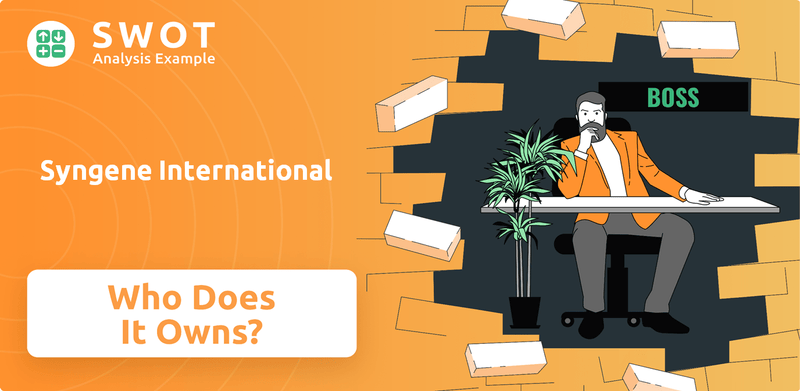
This exploration into Syngene International SWOT Analysis will illuminate the evolution of Syngene ownership, tracing its journey from its roots with Biocon to its present-day composition. We'll analyze the impact of its IPO and the influence of its key investors, providing a comprehensive understanding of this prominent Indian company. Discover how these shifts have shaped Syngene International's trajectory and governance, answering questions like "Who is the CEO of Syngene International?" and "Is Syngene a subsidiary of Biocon?" to fully understand its current position in the market.
Who Founded Syngene International?
The inception of Syngene International, a prominent player in the biopharma sector, traces back to 1993. It was established as a subsidiary of Biocon Limited, an Indian company with a strong foothold in the biopharmaceutical industry. This initial structure significantly shaped the Syngene ownership and early operational dynamics.
The founding of Syngene was intrinsically linked to Biocon's strategic vision. Kiran Mazumdar-Shaw, the founder of Biocon, played a pivotal role in the creation of Syngene. Her foresight aimed to utilize Biocon's scientific capabilities and infrastructure to provide contract research services, thereby diversifying its business model.
As a subsidiary, Syngene's early ownership was entirely vested in Biocon. This meant there were no external investors or individual founders with separate equity stakes. This structure provided a solid foundation for Syngene to grow and establish itself in the contract research organization (CRO) market.
Kiran Mazumdar-Shaw, founder of Biocon, spearheaded the creation of Syngene International. Her vision was to leverage Biocon's expertise.
Initially, Syngene ownership was entirely held by Biocon Limited. This made Biocon the sole owner and provided the necessary financial and strategic support.
Syngene was established as a wholly-owned subsidiary of Biocon. This structure simplified initial operations and control.
The primary goal was to diversify Biocon's revenue streams and expand its scientific footprint. This involved offering contract research services to global pharmaceutical and biotechnology companies.
Financial backing came from Biocon's existing resources. There were no external investors or initial public offerings (IPOs) at this stage.
Control was centralized within Biocon's corporate governance framework. This ensured alignment with Biocon's overall strategic objectives.
The early years of Syngene International were marked by its close integration with Biocon. The focus was on building a strong foundation in contract research. As of 2024, Syngene continues to operate, with its ownership structure evolving over time. For a deeper dive into the competitive environment, you can explore the Competitors Landscape of Syngene International. The company's journey from a Biocon subsidiary to a significant player in the CRO market reflects a strategic vision. In 2024, Biocon held a significant stake in Syngene, though the exact percentage has varied due to market dynamics and public offerings.
Syngene International SWOT Analysis
- Complete SWOT Breakdown
- Fully Customizable
- Editable in Excel & Word
- Professional Formatting
- Investor-Ready Format
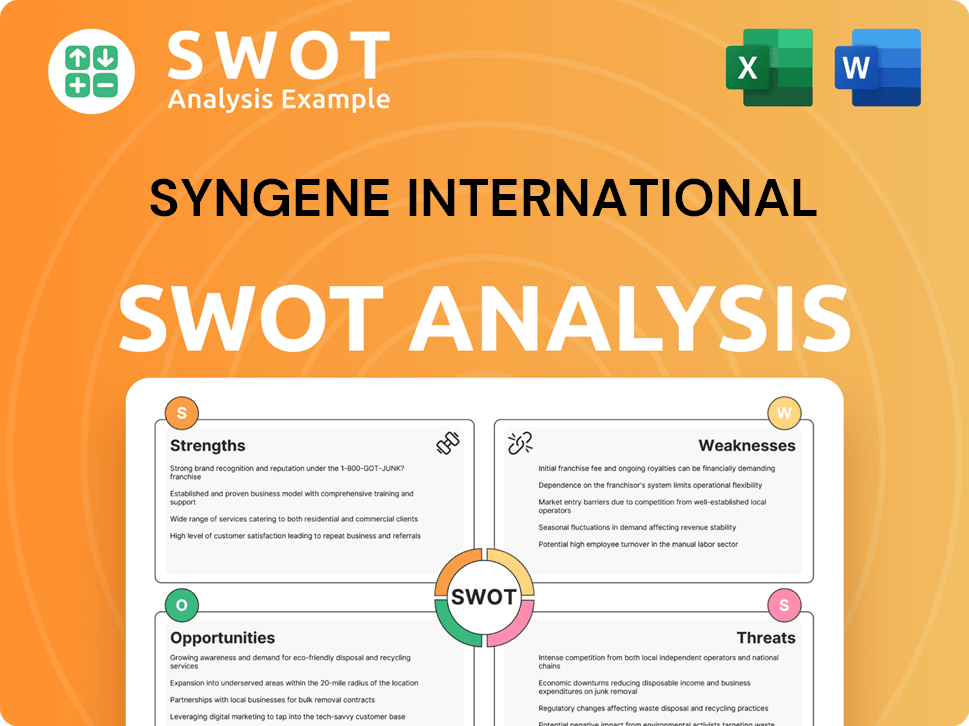
How Has Syngene International’s Ownership Changed Over Time?
The ownership structure of Syngene International, an Indian company specializing in biopharma research services, has evolved significantly since its inception. A pivotal moment was the Initial Public Offering (IPO) in August 2015. This IPO raised approximately INR 7.8 billion (around USD 120 million at the time), allowing Biocon, the parent company, to dilute a portion of its stake. This strategic move aimed to unlock value and provide Syngene with greater financial independence.
Following the IPO, Syngene's shares were listed on both the Bombay Stock Exchange (BSE) and the National Stock Exchange (NSE). This event marked a transition towards a more diversified shareholder base, including institutional investors and the public. The listing enhanced the company's visibility and access to capital markets, influencing its strategic direction and governance.
| Event | Impact on Ownership | Date |
|---|---|---|
| IPO | Dilution of Biocon's stake, increased public ownership | August 2015 |
| Listing on BSE and NSE | Enhanced market visibility, broader investor base | August 2015 |
| Ongoing Institutional Investment | Significant holdings by FPIs, DIIs, and mutual funds | Ongoing |
As of early 2025, Biocon remains the largest single shareholder in Syngene International, retaining considerable influence. However, the ownership structure is characterized by a diverse mix of institutional investors, including foreign portfolio investors (FPIs), domestic institutional investors (DIIs), mutual funds, and insurance companies. As of December 31, 2024, public shareholders held a significant percentage of Syngene's equity. This diversification has led to greater transparency and adherence to public market regulations, while Biocon continues to exert influence as the promoter group. The shift has also introduced market forces and shareholder activism, impacting company strategy and governance.
Syngene International's ownership structure has evolved significantly since its IPO in 2015, with Biocon retaining a significant but reduced stake.
- The IPO brought in a broader range of shareholders, including institutional investors.
- Public shareholders, including various institutional and individual investors, hold a significant portion of Syngene's equity.
- Biocon remains the largest single shareholder, but the company operates with increased financial autonomy.
- The diversification of ownership has led to greater transparency and adherence to public market regulations.
Syngene International PESTLE Analysis
- Covers All 6 PESTLE Categories
- No Research Needed – Save Hours of Work
- Built by Experts, Trusted by Consultants
- Instant Download, Ready to Use
- 100% Editable, Fully Customizable
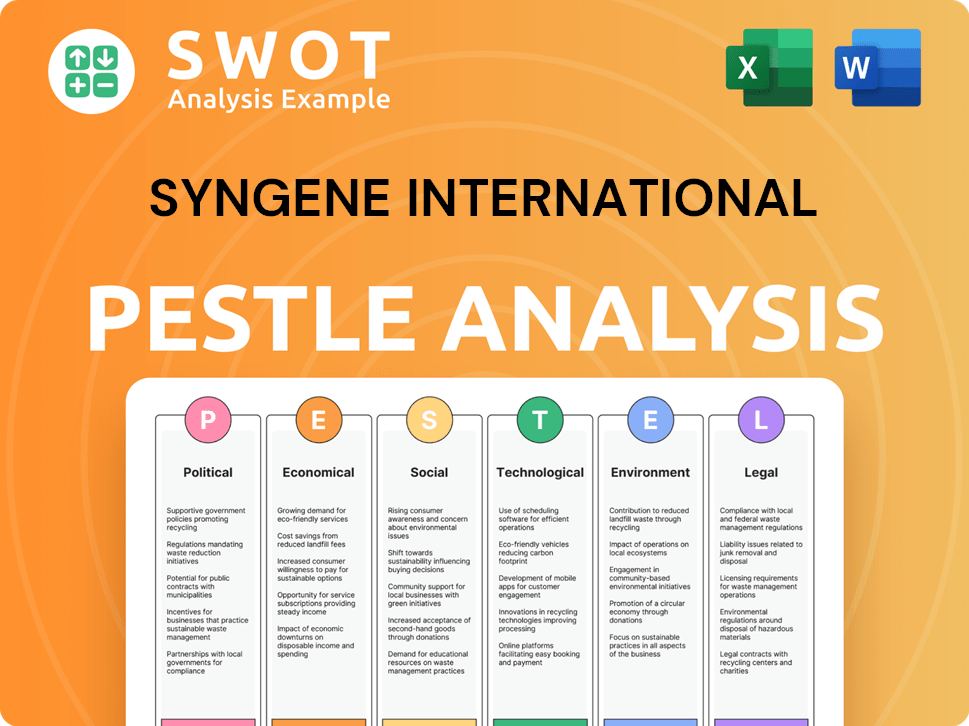
Who Sits on Syngene International’s Board?
As of early 2025, the Board of Directors of Syngene International includes a blend of representatives from its major shareholder, independent directors, and executive management. The board's composition typically features nominees from Biocon Limited, reflecting its significant ownership stake in the Indian company. Independent directors are crucial for providing external expertise and oversight, which is essential for a publicly listed entity. The presence of Biocon's representatives on the board ensures alignment with the parent company's strategic vision, while independent directors contribute to robust corporate governance and protect the interests of all shareholders.
The board's structure is designed to maintain a balance between the interests of the parent company, Biocon, and the broader shareholder base. The independent directors bring external perspectives and ensure that the company adheres to best practices in corporate governance. The specific individuals on the board and their roles can be found in the company's annual reports and public filings. For more insights, you can explore the Marketing Strategy of Syngene International.
| Board Member | Role | Affiliation |
|---|---|---|
| Kiran Mazumdar-Shaw | Chairperson | Biocon Limited |
| Jonathan Hunt | Managing Director & CEO | Syngene International |
| M. B. N. Rao | Independent Director | Independent |
The voting structure at Syngene International generally follows the one-share-one-vote principle, which is common for publicly traded companies in India. This means that each share carries equal voting rights. There are typically no special voting rights or founder shares that grant outsized control to specific individuals or entities beyond their proportional shareholding. Major institutional investors can indirectly shape decision-making by exercising their voting rights on key resolutions, including board appointments and strategic initiatives. The company's governance structure is designed to ensure fairness and transparency for all shareholders, reflecting its commitment to responsible corporate governance practices and the interests of all stakeholders in the biopharma sector.
Understanding the board structure and voting rights is crucial for investors and stakeholders of Syngene International.
- The board includes representatives from Biocon, the major Syngene owner.
- Independent directors provide oversight and expertise.
- Voting follows a one-share-one-vote principle.
- Institutional investors can influence decisions through voting.
Syngene International Business Model Canvas
- Complete 9-Block Business Model Canvas
- Effortlessly Communicate Your Business Strategy
- Investor-Ready BMC Format
- 100% Editable and Customizable
- Clear and Structured Layout
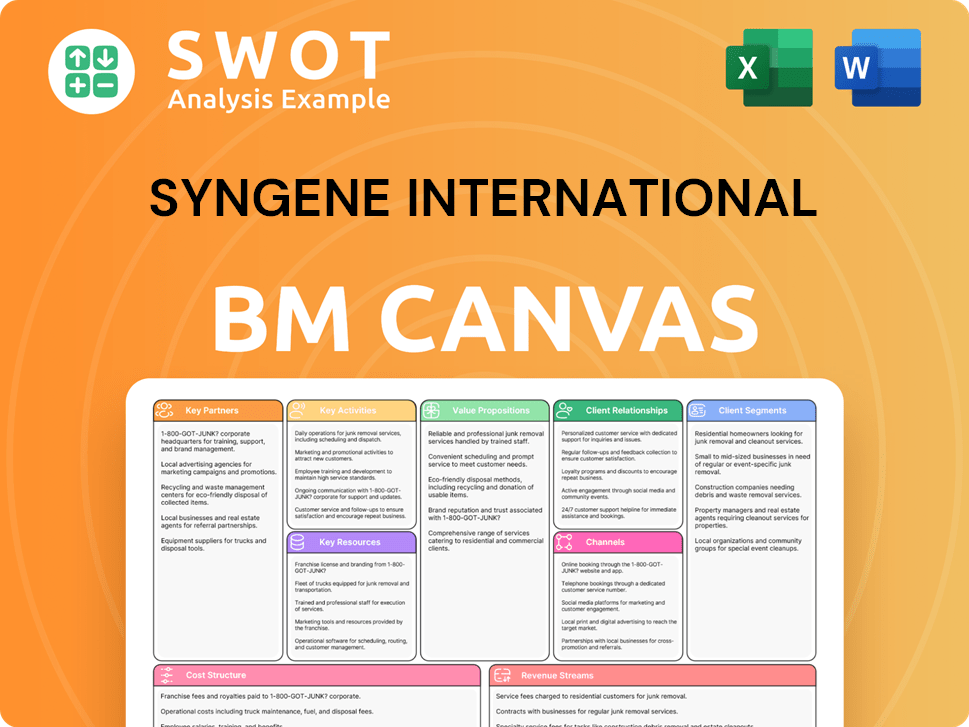
What Recent Changes Have Shaped Syngene International’s Ownership Landscape?
Over the past three to five years (2022-2025), the ownership structure of Syngene International has largely seen a continuation of increasing institutional ownership. This trend is typical for well-performing public companies. While Biocon Limited remains a significant shareholder, its stake has seen gradual adjustments. These adjustments primarily support Syngene's independent growth and enhance market value. There have been no major announcements of significant share buybacks or secondary offerings impacting the ownership structure. Also, there have been no major leadership departures that directly influenced ownership during this period. The company's focus on expanding its capabilities has attracted a diverse investor base.
The contract research and manufacturing services (CRAMS) industry has seen consolidation and increased investor interest. This is driven by the growing outsourcing needs of pharmaceutical and biotechnology companies. This industry trend has likely contributed to the sustained institutional interest in Syngene ownership. Future changes could include further strategic divestments by Biocon, although no definitive statements regarding complete founder dilution or privatization have been made. Any future capital raising or strategic partnerships could lead to minor shifts in the ownership profile. The company continues to expand its client base, which helps retain a diverse investor base. The company is an Indian company in the Biopharma sector.
There have been no major share buybacks or secondary offerings that drastically altered the ownership structure. The company's focus on expanding its capabilities and client base continues to attract and retain a diverse investor base. Any future capital raising or strategic partnerships could lead to minor shifts in the ownership profile.
Institutional ownership has been increasing, a common trend in well-performing public companies. Biocon Limited remains a key shareholder, with gradual stake adjustments. The CRAMS industry's consolidation and investor interest are contributing factors to this trend. Future strategic divestments by Biocon are possible, but no definitive plans have been announced.
Syngene International Porter's Five Forces Analysis
- Covers All 5 Competitive Forces in Detail
- Structured for Consultants, Students, and Founders
- 100% Editable in Microsoft Word & Excel
- Instant Digital Download – Use Immediately
- Compatible with Mac & PC – Fully Unlocked
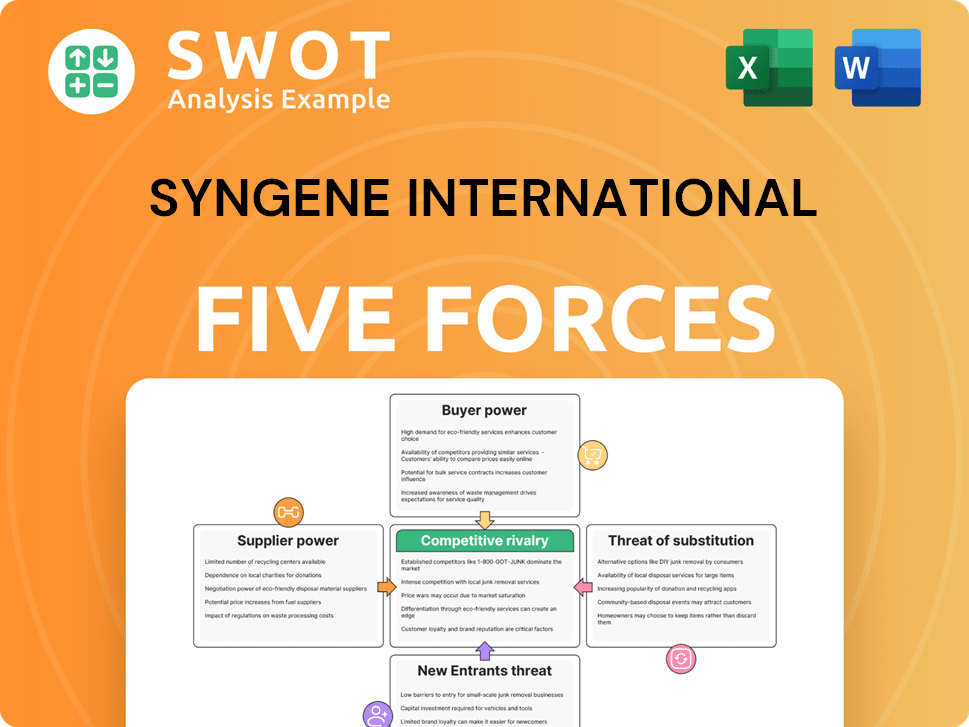
Related Blogs
- What are Mission Vision & Core Values of Syngene International Company?
- What is Competitive Landscape of Syngene International Company?
- What is Growth Strategy and Future Prospects of Syngene International Company?
- How Does Syngene International Company Work?
- What is Sales and Marketing Strategy of Syngene International Company?
- What is Brief History of Syngene International Company?
- What is Customer Demographics and Target Market of Syngene International Company?
Disclaimer
All information, articles, and product details provided on this website are for general informational and educational purposes only. We do not claim any ownership over, nor do we intend to infringe upon, any trademarks, copyrights, logos, brand names, or other intellectual property mentioned or depicted on this site. Such intellectual property remains the property of its respective owners, and any references here are made solely for identification or informational purposes, without implying any affiliation, endorsement, or partnership.
We make no representations or warranties, express or implied, regarding the accuracy, completeness, or suitability of any content or products presented. Nothing on this website should be construed as legal, tax, investment, financial, medical, or other professional advice. In addition, no part of this site—including articles or product references—constitutes a solicitation, recommendation, endorsement, advertisement, or offer to buy or sell any securities, franchises, or other financial instruments, particularly in jurisdictions where such activity would be unlawful.
All content is of a general nature and may not address the specific circumstances of any individual or entity. It is not a substitute for professional advice or services. Any actions you take based on the information provided here are strictly at your own risk. You accept full responsibility for any decisions or outcomes arising from your use of this website and agree to release us from any liability in connection with your use of, or reliance upon, the content or products found herein.